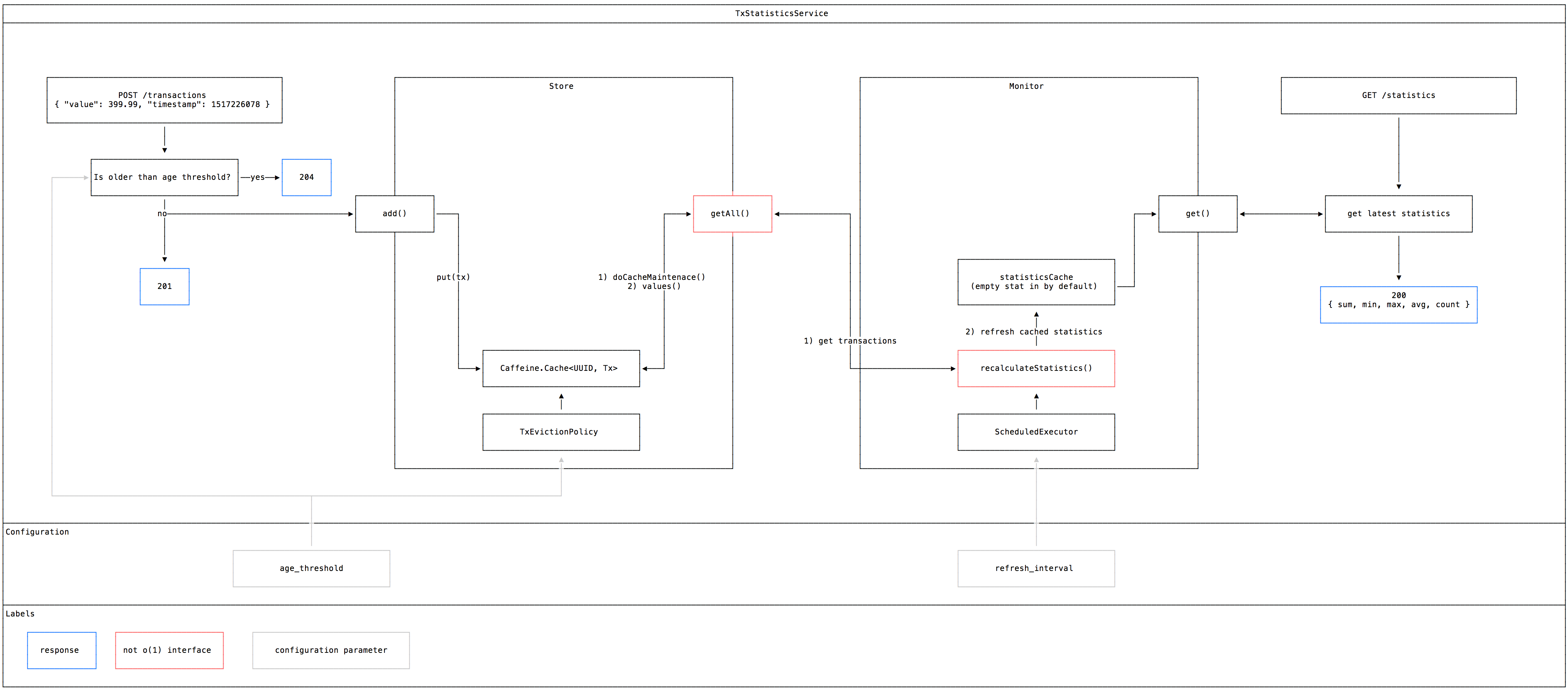Transaction Statistics Service
Service responsible for calculating statistics of transactions.
SYNOPSIS
This is a standalone package, there's no external service dependencies.
- To test:
mvn test - To package:
mvn package - To run:
java -jar target/transaction-statistics-service.jar server config.yml - To benchmark:
cd bench/; locust --host=http://localhost:8080- This expects to have a service running on localhost:8080 (default)
- This expects that you installed the requirements in your environment
The documentation is made and editable with Monodraw.
CONFIGURATION
Apart from default dropwizard configuration options, there's two extra configuration parameters you can change in config.yml:
age_threshold_msregulates the ttl of transactions (calculated from the submitted timestamp of the transaction)- transactions posted to /transactions will have to be younger than
now - age_threshold_ms - transactions stored and included in statistics will be evicted after they become older than
age_threshold_ms
- transactions posted to /transactions will have to be younger than
statistics_refresh_interval_mscontrols how often the statistics are recalculated from the stored transactions
DESIGN NOTES
How it works
Both POST /transactions and GET /statistics is constant time. At the transaction endpoint this is achieved by moving the store and eviction
efforts into EvictingTransactionStore.
The statistics endpoint is decoupled from the calculating efforts and always returns the last cached statistic from CachingTransactionMonitor, which
is recalculates in the background on a schedule set by statistics_refresh_interval_ms.
EvictingTransactionStore
The evicting transaction store is responsible for storing, listing and evicting transactions based on their age
(controlled by age_threshold_ms), it relies on
Caffeine's Cache
which offers O(1) methods.
Eviction.
Eviction is done via a custom implementation of Expiry
which sets the eviction time based on the difference between the transaction's age and now - age_threshold_ms.
In Caffeine, evicted transactions may be removed at following write operations (at a background thread)
or at most when listing through EvictingTransactionStore#getTransactions().
Listing.
When listing transactions, all values from the cache are returned after all pending cleanup efforts in Caffeine are executed to ensure consistent results.
CachingTransactionMonitor
The transaction monitor is responsible for calculating and caching the latest statistics based on the entries in the store,
a scheduled executor is recalculates the cache at every statistics_refresh_interval_ms milliseconds, the result is available as an O(1) get method.
Limitations
Memory usage
Since all transactions are stored in-memory, even with Caffeine, a large enough amount of transactions coming in could cause the service to run out of memory.
Not horizontally scalable
Given the in-memory nature of the implementation, multiple instances will not share the dataset used to calculate averages, stress tests to test how performance scales with added hardware would be interesting.
Not distributed system friendly
There's no Swagger documentation, the ObjectMapper is just created here (whereas for (de)serializtion other services
may use their own), there's no health checks nor clock sync, no environments, no json logging for non-dev environments.
Not (at all) fault tolerant
There's no persistence, i guess that's O.K. for now given the spontanity of the data (the data lost may be irrelevant by the time the service is started again).
No unittest of transaction eviction
A nice, external clock based unittest of the store would make me feel better, did things the fast way here with a bunch of integration tests.
Weird names
Weird names, probably could be eased if i could talk to a domain expert.
Positive time discrepancies is not corrected
The API should be able to deal with time discrepancy, which means, at any point of time, we could receive a transaction which have a timestamp of the past
Timestamps from the future is not excluded from the window of now - threshold, i assumed transactions posted here already took place, hope that's ok,
i'm open for discussing how this correction could be implemented. ^^
GOTCHA
Not setting "-parameters" argument in your IDE
When you don't set -parameters as a compiler argument in your
IDE (for example when playing around with tests), all sorts of weird things start to happen with (de)serialization, this is because Jackson relies
on the parameter names when you don't explicitly define @JsonParameter("nameOfParam") for a constructor argument.
Annotating everything is kinda bloaty, things look a bit cleaner this way, check out the Jackson docs for more.
